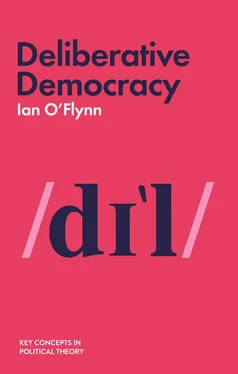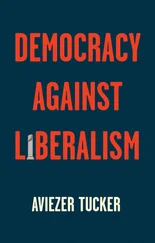In the first instance, this book is about the concept of deliberative democracy and the many different ways in which the concept has been understood. It is, more specifically, about deliberative democracy as a normative project – a project concerned with evaluating existing democratic institutions and practices and proposals for their reform. It almost goes without saying that normative claims imply empirical questions, some of which are discussed in this book. However, the book is principally located in the broader field of political theory (or, if one prefers, political philosophy).
Of course, political theorists disagree among themselves about the nature, scope and purpose of deliberative democracy. My view is that deliberative democracy is essentially concerned with the question of political legitimacy. It is concerned with the process or processes by which governments acquire the right or authority to make decisions that are binding on us all. On a deliberative view, what matters is not that people talk and argue with one another, but that they genuinely attempt to discuss with one another, seeking out reasons and considerations that are in principle acceptable to all. Granted, in modern mass democracies, the idea that elections should be free and fair is also an important part of the story. But ultimately what matters is meaningful public discussion about the important decisions of the day. Some deliberative democrats shy away from the emphasis on decision-making. Some are more concerned with democratic deliberation (even if that has little direct bearing on governmental decision-making or occurs in nondemocratic political settings) than with deliberative democracy as I have just described it. Yet while these alternative perspectives do appear at points throughout the book, they are not central to it. They are not central because, in my view, our guiding concern should be the legitimacy of the decisions that governments make in our name.
I should also say that, while the book is about the concept of deliberative democracy, it seemed to me essential to engage with the major figures in the field. No serious book on deliberative democracy could fail to engage with the works of both Jürgen Habermas and John Rawls. Nor could it fail to engage with the works of thinkers such as Joshua Cohen, John Dryzek, Robert Goodin, Amy Gutmann and Dennis Thompson, James Fishkin, Jane Mansbridge and Mark Warren. Certainly, there are many other important thinkers in the field, but the choice of these thinkers needed little or no justification.
In preparing this book, I have received a great deal of help and support. First and foremost, I must thank my colleague, Peter Jones, for many years of discussion on these and other related philosophical topics. I must also thank Albert Weale for all his years of generous mentorship and support. I am grateful to Jane Mansbridge for extensive comments on the original proposal. I also received helpful comments on the proposal from two anonymous referees. For comments on the entire manuscript, I must thank George Owers, whom I must also thank for commissioning the book in the first place, as well as Polity’s three anonymous readers. The readers were both insightful and encouraging, and the book is certainly all the better for having been put through the review process. For comments on individual chapters, I wish to thank André Bächtiger, Ron Levy, William Smith and Albert Weale. Directly or indirectly, the book has also benefitted from discussions at various points over the years with Emmanuel Ani, Richard Bellamy, Didier Caluwaerts, Manlio Cinalli, Nicole Curato, John Drzyek, Stephen Elstub, Selen Ercan, Oliver Escobar, Andrea Felicetti, James Fishkin, Matteo Gianni, Robert Goodin, Marco Guigni, Marit Hammond, Clodagh Harris, Hoi Kong, Ian Johnson, Andrew Knops, Jonathan Kuyper, Ruth Lightbody, Robert Luskin, Peter McLaverty, Michael Morrell, Simon Niemeyer, Tony O’Connor, Shane O’Neill, John Parkinson, Vijayendra Rao, Stefan Rummens, David Russell, Victor Sanchez-Mazas, Jensen Sass, Maija Setälä, Gaurav Sood, Ana Tanasoca, Paul Vittles, Mark Warren and Marta Wojciechowska.
I owe the biggest thanks of all to my family. Writing this book was an arduous task and it would not have been possible without their encouragement and support. All too often, I worked on the book when I really should have been with them. For that I am sorry. This book is dedicated, with love and gratitude, to my wife Laura and our two wonderful children, Isla (aged six) and Tom (aged four).
For Laura, Isla and Tom
Deliberative democracy is a normative view about how democracies should be arranged – about how their basic institutions should be structured and about how their members should engage with one another when deciding important matters of law and public policy. In the words of Joshua Cohen:
The notion of a deliberative democracy is rooted in the intuitive ideal of a democratic association in which the justification of the terms and conditions of association proceeds through public argument and reasoning among equal citizens. Citizens in such an order share a commitment to the resolution of problems of collective choice through public reasoning, and regard their basic institutions as legitimate in so far as they establish the framework for free public deliberation. (1989, 21)
Of course, no actually functioning democracy fully answers to this ideal. Arguably, none comes even close. But deliberative democrats believe that the ideal can and ought to be pursued. They contend that democracies can be reformed in more deliberative directions, and they have developed a range of different theories, or approaches, to that end. While deliberative democrats do not agree on every point, they do agree that democratic legitimacy should be rooted in deliberation. People should give reasons for their views, but they should be equally willing to listen with an open mind to what others have to say. At the end of the day, they may still have to vote to resolve the disagreement that deliberation leaves unresolved. But what they will be registering at that point is not their prior views and opinions but an enlarged or more encompassing point of view.
Deliberative democracy, then, is an approach to democracy that emphasizes the importance of deliberation. As the Oxford English Dictionary defines it, deliberation is ‘the action of thinking carefully about something, especially in order to reach a decision’. In a deliberative democracy, that action or activity is something that people do together as political equals. They give reasons for their views, and they seek to weigh those reasons equally in balance (Fishkin 2018, 21). In other words, they seek to assess them on their merits in an endeavour to arrive at an agreed judgement or a shared view. So described, what is genuinely interesting and challenging about deliberative democracy is not that people talk and argue with one another, but that they genuinely attempt to discuss with one another, seeking out ‘considerations capable of determining the intellect’, to use John Stuart Mill’s ([1871] 2007, 4) phrase. This is obviously a demanding standard – one we will return to repeatedly throughout this book. But at this early juncture, it is worth noting that deliberative democracy is not a new idea.
For instance, writing in 1788 in defence of the newly drafted United States Constitution, James Madison famously argued that new structures for governing the nation were needed not just to contain the perils of political faction, but to enable ‘the mild voice of reason, pleading the cause of an enlarged and permanent interest’ to prevail over ‘the clamours of an impatient avidity for immediate and immoderate gain’ (Shapiro 2009, 216). The degree to which the constitution championed by Madison has succeeded in turning American national government into a deliberative democracy is a moot point (Bessette 1994, 3). At the time of writing, Donald Trump has just been voted out of office and the prospects for a more deliberative democracy are once again improving. However, powerful factions continue to push their own narrow agendas, while many at the margins of society are still being denied a genuine voice. Of course, the United States is hardly unique in these respects. Right around the world, there are many national leaders who favour populist rhetoric over the mild voice of reason. The failure to curtail the spread of misinformation on social media is deeply troubling, as is the failure to properly regulate social media companies themselves. Yet while the challenges are certainly great, deliberative democracy is itself a powerful intellectual movement.
Читать дальше












